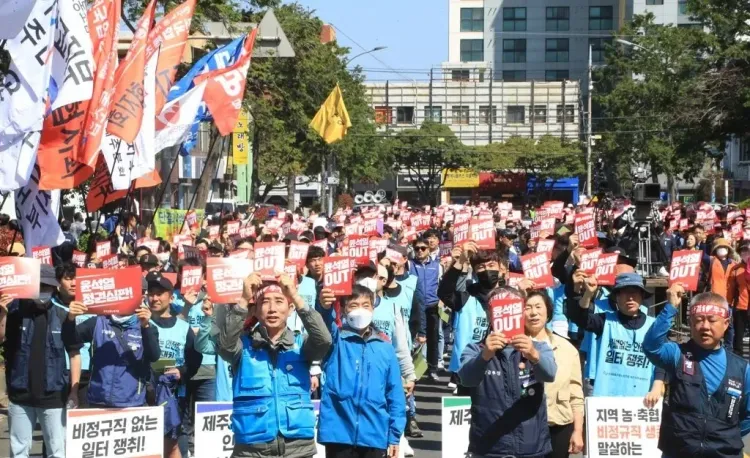Will Financial Workers in South Korea Strike This Month?

Synopsis
Key Takeaways
- 95 percent of KFIU members voted for the strike.
- Strike scheduled for September 26.
- Demands include wage hikes and a 4.5-day workweek.
- Calls for increased hiring and extension of retirement age.
- Samsung Electronics workers also seeking bonus transparency.
Seoul, Sep 2 (NationPress) On Tuesday, unionised financial workers cast their votes in favor of a one-day nationwide strike later this month, advocating for a wage increase and a 4.5-day workweek. The Korean Financial Industry Union (KFIU) reported that approximately 95 percent of its members supported the strike scheduled for September 26, according to Yonhap news agency.
The KFIU, which is associated with the Federation of Korean Trade Unions—one of South Korea's two major umbrella unions—represents the country's primary private and state banks, along with various financial institutions. The union is also pushing for increased hiring and the extension of the retirement age.
In a related development, workers at Samsung Electronics submitted a letter to Chairman Lee Jae-yong on Tuesday, urging the company to enhance the transparency of its bonus system.
The correspondence to the effective leader of Samsung Group demanded the implementation of a more transparent bonus evaluation system and the discontinuation of the current model based on economic value added (EVA).
The union stated, "While SK hynix recently decided to allocate 10 percent of its annual operating profit to its bonus program, Samsung Electronics continues to rely on the EVA method, which is opaque."
Just a day prior, SK hynix Inc. and its labor union reached a preliminary wage agreement whereby the company will set aside 10 percent of its annual operating profit for the profit-sharing bonus program, eliminating the previous cap that restricted bonuses to 1,000 percent of employees' basic wage.
The union added, "Under the existing system, bonuses could be zero even if the company reports a substantial operating profit, and there is also a ceiling in place."
"While it may be too late to regain workers' trust, the company should at the very least demonstrate a willingness to change," the union emphasized.
At the market's close, top market cap Samsung Electronics saw a rise of 2.22 percent to 69,100 won, while the second-largest chipmaker, SK hynix, increased by 1.76 percent to 260,500 won.








